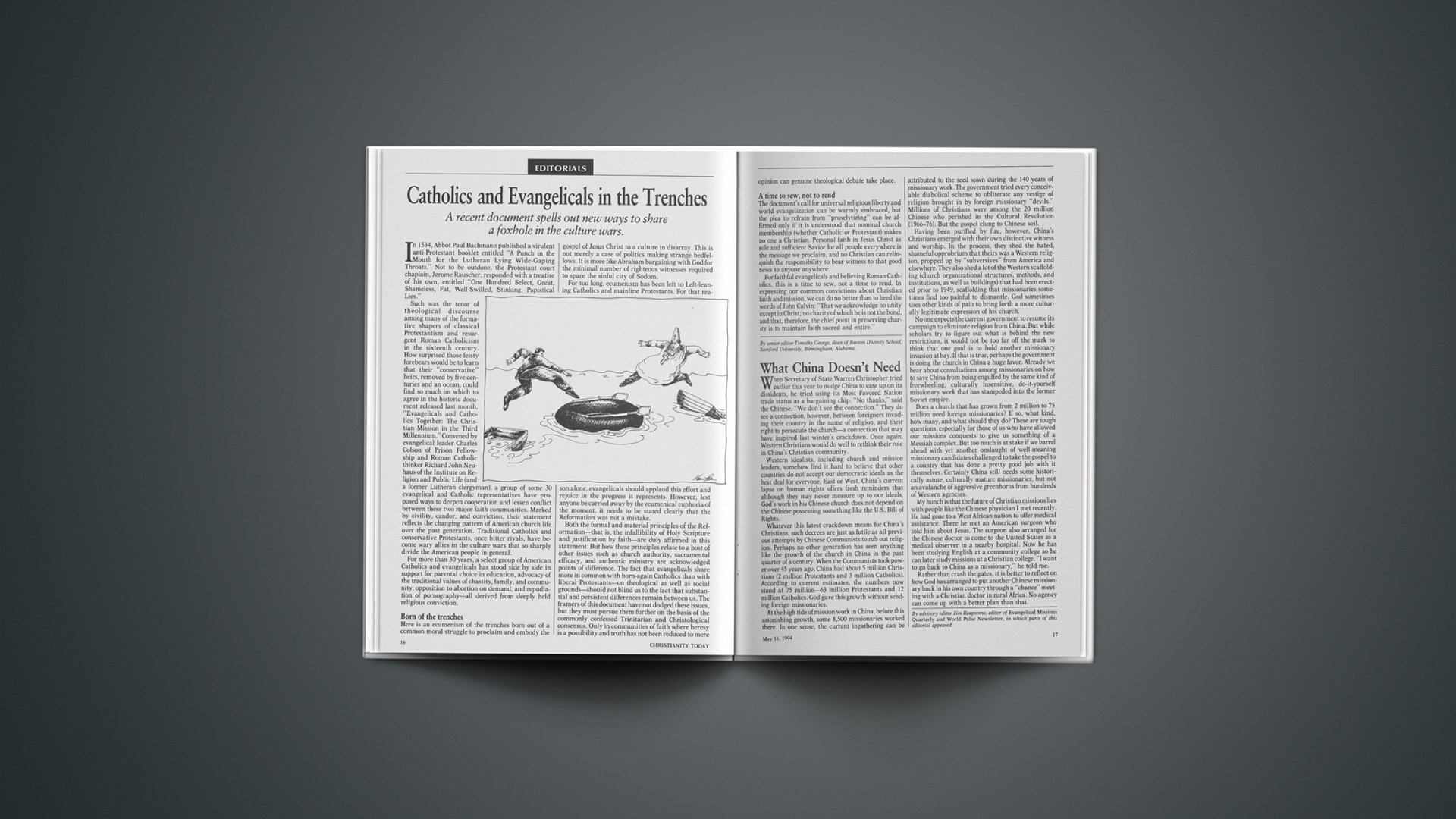Catholics And Evangelicals In The Trenches
A recent document spells out new ways to share a foxhole in the culture wars.
In 1534, Abbot Paul Bachmann published a virulent anti-Protestant booklet entitled “A Punch in the Mouth for the Lutheran Lying Wide-Gaping Throats.” Not to be outdone, the Protestant court chaplain, Jerome Rauscher, responded with a treatise of his own, entitled “One Hundred Select, Great, Shameless, Fat, Well-Swilled, Stinking, Papistical Lies.”
Such was the tenor of theological discourse among many of the formative shapers of classical Protestantism and resurgent Roman Catholicism in the sixteenth century. How surprised those feisty forebears would be to learn that their “conservative” heirs, removed by five centuries and an ocean, could find so much on which to agree in the historic document released last month, “Evangelicals and Catholics Together: The Christian Mission in the Third Millennium.” Convened by evangelical leader Charles Colson of Prison Fellowship and Roman Catholic thinker Richard John Neuhaus of the Institute on Religion and Public Life (and a former Lutheran clergyman), a group of some 30 evangelical and Catholic representatives have proposed ways to deepen cooperation and lessen conflict between these two major faith communities. Marked by civility, candor, and conviction, their statement reflects the changing pattern of American church life over the past generation. Traditional Catholics and conservative Protestants, once bitter rivals, have become wary allies in the culture wars that so sharply divide the American people in general.
For more than 30 years, a select group of American Catholics and evangelicals has stood side by side in support for parental choice in education, advocacy of the traditional values of chastity, family, and community, opposition to abortion on demand, and repudiation of pornography—all derived from deeply held religious conviction.
Born of the trenches
Here is an ecumenism of the trenches born out of a common moral struggle to proclaim and embody the gospel of Jesus Christ to a culture in disarray. This is not merely a case of politics making strange bedfellows. It is more like Abraham bargaining with God for the minimal number of righteous witnesses required to spare the sinful city of Sodom.
For too long, ecumenism has been left to Left-leaning Catholics and mainline Protestants. For that reason alone, evangelicals should applaud this effort and rejoice in the progress it represents. However, lest anyone be carried away by the ecumenical euphoria of the moment, it needs to be stated clearly that the Reformation was not a mistake.
Both the formal and material principles of the Reformation—that is, the infallibility of Holy Scripture and justification by faith—are duly affirmed in this statement. But how these principles relate to a host of other issues such as church authority, sacramental efficacy, and authentic ministry are acknowledged points of difference. The fact that evangelicals share more in common with born-again Catholics than with liberal Protestants—on theological as well as social grounds—should not blind us to the fact that substantial and persistent differences remain between us. The framers of this document have not dodged these issues, but they must pursue them further on the basis of the commonly confessed Trinitarian and Christological consensus. Only in communities of faith where heresy is a possibility and truth has not been reduced to mere opinion can genuine theological debate take place.
A time to sew, not to rend
The document’s call for universal religious liberty and world evangelization can be warmly embraced, but the plea to refrain from “proselytizing” can be affirmed only if it is understood that nominal church membership (whether Catholic or Protestant) makes no one a Christian. Personal faith in Jesus Christ as sole and sufficient Savior for all people everywhere is the message we proclaim, and no Christian can relinquish the responsibility to bear witness to that good news to anyone anywhere.
For faithful evangelicals and believing Roman Catholics, this is a time to sew, not a time to rend. In expressing our common convictions about Christian faith and mission, we can do no better than to heed the words of John Calvin: “That we acknowledge no unity except in Christ; no charity of which he is not the bond, and that, therefore, the chief point in preserving charity is to maintain faith sacred and entire.”
By senior editor Timothy George, dean of Beeson Divinity School, Samford University, Birmingham, Alabama.
What China Doesn’T Need
When Secretary of State Warren Christopher tried earlier this year to nudge China to ease up on its dissidents, he tried using its Most Favored Nation trade status as a bargaining chip. “No thanks,” said the Chinese. “We don’t see the connection.” They do see a connection, however, between foreigners invading their country in the name of religion, and their right to persecute the church—a connection that may have inspired last winter’s crackdown. Once again, Western Christians would do well to rethink their role in China’s Christian community.
Western idealists, including church and mission leaders, somehow find it hard to believe that other countries do not accept our democratic ideals as the best deal for everyone, East or West. China’s current lapse on human rights offers fresh reminders that although they may never measure up to our ideals, God’s work in his Chinese church does not depend on the Chinese possessing something like the U.S. Bill of Rights.
Whatever this latest crackdown means for China’s Christians, such decrees are just as futile as all previous attempts by Chinese Communists to rub out religion. Perhaps no other generation has seen anything like the growth of the church in China in the past quarter of a century. When the Communists took power over 45 years ago, China had about 5 million Christians (2 million Protestants and 3 million Catholics). According to current estimates, the numbers now stand at 75 million—63 million Protestants and 12 million Catholics. God gave this growth without sending foreign missionaries.
At the high tide of mission work in China, before this astonishing growth, some 8,500 missionaries worked there. In one sense, the current ingathering can be attributed to the seed sown during the 140 years of missionary work. The government tried every conceivable diabolical scheme to obliterate any vestige of religion brought in by foreign missionary “devils.” Millions of Christians were among the 20 million Chinese who perished in the Cultural Revolution (1966–76). But the gospel clung to Chinese soil.
Having been purified by fire, however, China’s Christians emerged with their own distinctive witness and worship. In the process, they shed the hated, shameful opprobrium that theirs was a Western religion, propped up by “subversives” from America and elsewhere. They also shed a lot of the Western scaffolding (church organizational structures, methods, and institutions, as well as buildings) that had been erected prior to 1949, scaffolding that missionaries sometimes find too painful to dismantle. God sometimes uses other kinds of pain to bring forth a more culturally legitimate expression of his church.
No one expects the current government to resume its campaign to eliminate religion from China. But while scholars try to figure out what is behind the new restrictions, it would not be too far off the mark to think that one goal is to hold another missionary invasion at bay. If that is true, perhaps the government is doing the church in China a huge favor. Already we hear about consultations among missionaries on how to save China from being engulfed by the same kind of freewheeling, culturally insensitive, do-it-yourself missionary work that has stampeded into the former Soviet empire.
Does a church that has grown from 2 million to 75 million need foreign missionaries? If so, what kind, how many, and what should they do? These are tough questions, especially for those of us who have allowed our missions conquests to give us something of a Messiah complex. But too much is at stake if we barrel ahead with yet another onslaught of well-meaning missionary candidates challenged to take the gospel to a country that has done a pretty good job with it themselves. Certainly China still needs some historically astute, culturally mature missionaries, but not an avalanche of aggressive greenhorns from hundreds of Western agencies.
My hunch is that the future of Christian missions lies with people like the Chinese physician I met recently. He had gone to a West African nation to offer medical assistance. There he met an American surgeon who told him about Jesus. The surgeon also arranged for the Chinese doctor to come to the United States as a medical observer in a nearby hospital. Now he has been studying English at a community college so he can later study missions at a Christian college. “I want to go back to China as a missionary,” he told me.
Rather than crash the gates, it is better to reflect on how God has arranged to put another Chinese missionary back in his own country through a “chance” meeting with a Christian doctor in rural Africa. No agency can come up with a better plan than that.
By advisiory editor Jim Reapsome, editor of Evangelical Missions Quarterly and World Pulse Newsletter, in which parts of this editorial appeared.










